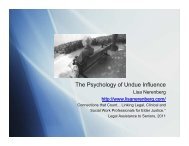Undue Influence: Definitions and Applications - California Courts ...
Undue Influence: Definitions and Applications - California Courts ...
Undue Influence: Definitions and Applications - California Courts ...
You also want an ePaper? Increase the reach of your titles
YUMPU automatically turns print PDFs into web optimized ePapers that Google loves.
Civil Code §1575 also describes a presumption of undue influence when fiduciary or<br />
confidential relationships exist <strong>and</strong> when perpetrators participate in obtaining an undue profit or<br />
unfair advantage over the elders. A long line of <strong>California</strong> cases has held that a presumption of<br />
undue influence is created when there is a confidential relationship between the testator <strong>and</strong> the<br />
influencer, a transfer for no consideration, an opportunity to exert undue influence, a particular<br />
susceptibility to undue influence on the part of the transferor, <strong>and</strong> an undue benefit to the party<br />
who participated in the transfer (Ross v Conway (1892) 92 Cal.632, 635) Confidential<br />
relationships can be established by the close proximity of the perpetrator to the elderly victim,<br />
<strong>and</strong> may include caregivers, nurses, friends, or relatives.<br />
<strong>California</strong>’s “prohibited transfers statute” (Probate Code §21350) creates a presumption<br />
of undue influence that prevents certain professionals from inheriting assets from clients unless<br />
they can demonstrate that they didn’t use fraud, menace, duress, or undue influence to get them.<br />
The presumption also covers “care custodians,” <strong>and</strong> specifies that those who receive last-minute<br />
bequests from dependent adults are presumed to have exercised undue influence, even if they<br />
were close friends of the deceased. There are several exceptions, including gifts to family<br />
members <strong>and</strong> gifts that have been reviewed by independent attorneys who certify that the gifts<br />
were not the product of menace, duress, fraud, or undue influence.<br />
The prohibited transfers statute was originally enacted in response to a high- profile case<br />
involving an estate-planning attorney who named himself <strong>and</strong> members of his family as<br />
fiduciaries for, <strong>and</strong> beneficiaries of, clients’ estates. Hence, law firms, lawyers, <strong>and</strong> employees of<br />
law firms associated with them are included in the list of people who cannot inherit unless they<br />
can prove that transfers weren't the product of fraud, menace, duress, or undue influence.<br />
The presumption also applies to “care custodians,” which has prompted debate <strong>and</strong><br />
controversy about what constitutes a care custodian. Bernard v. Foley involved 97-year-old<br />
Carmel Bosco, who left her half million-dollar estate to two friends who cared for her during the<br />
last months of her life. While under their care, Bosco amended her living trust several times,<br />
giving more each time to the caregivers until, a few days before her death, she made them the<br />
beneficiaries of her entire estate. Bosco’s family, the original beneficiaries, sued, claiming that<br />
the caregivers had exerted undue influence over Bosco while she was gravely ill <strong>and</strong> heavily<br />
sedated. The case focused on whether the friends were in fact “care custodians,” <strong>and</strong> therefore,<br />
109




